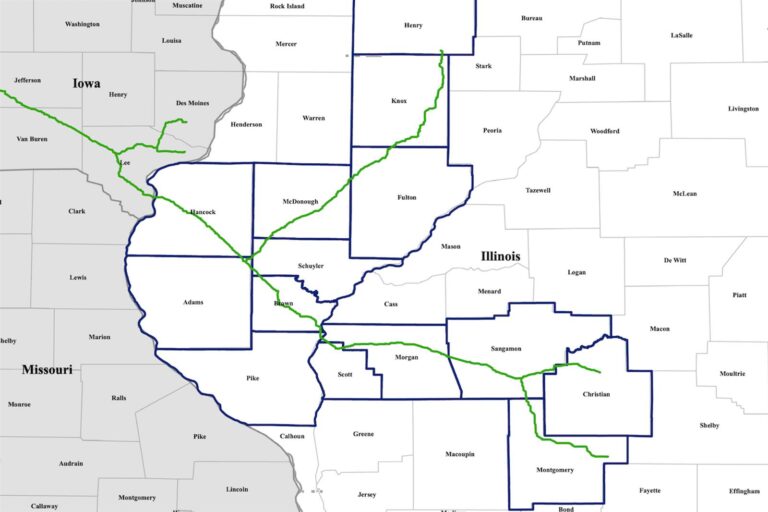Navigator CO2, a Nebraska-based company specializing in carbon capture and sequestration, announced Friday it is canceling plans to build a 1,300-mile carbon dioxide pipeline that would have run through central Illinois.
The plan included several hundred miles of pipeline in Illinois which terminated at sequestration sites designed to store the greenhouse gas underground. The company, which pulled its permit application at the Illinois Commerce Commission less than two weeks ago, said the cancellation was due to the “unpredictable nature” of the regulatory processes involved in permitting such a project.
The company recently had its permit denied in South Dakota and faced regulatory uncertainty in Iowa before ultimately withdrawing their application in that state.
“We are disappointed that we will not be able to provide services to our customers and thank them for their continued support.” Navigator CO2 CEO Matt Vining said in a news release.
The project was met with significant pushback from environmentalists and landowners in Illinois, who shared concerns about safety and the company’s request to use eminent domain to obtain land or usage rights if necessary.
Much of the work to oppose the project was organized through the Coalition to Stop CO2 Pipelines, which helped form a separate group to intervene in the state’s regulatory proceeding, attracting landowners and several county governments to its cause.
“This is, I think, the result of successful organizing,” Pam Richart, the coalition’s president, told Capitol News Illinois. “While we’re happy to hear it, there are a lot of federal tax dollars on the table for carbon sequestration.”
The federal Infrastructure Investment and Jobs Act of 2021, known as the bipartisan infrastructure bill when it went through Congress, allocated $12 billion in funding for carbon capture, utilization and storage projects.
Richart said available federal funding would continue to incentivize companies to propose similar projects. Illinois’ unique geology makes it a natural candidate for carbon sequestration.
“If it’s not Navigator, it’s going to be someone else,” she said.
Richart said her group will devote more resources to combating other similar projects and advocate for state-level regulation of the carbon sequestration sector.
Currently, state regulators are considering a separate proposal from Wolf Carbon Solutions and Archer Daniels Midland Co. to build a pipeline that would transport carbon dioxide created as a byproduct of ethanol production and store it underground in central Illinois.
That project has also been met with pushback from Richart’s group and others, leading some to call for state-level reform. This spring, lawmakers introduced competing bills – one backed by industry groups and another by environmental advocates – that would create a framework for regulating the safety of this kind of project. Those bills were never called for a vote. While Rep. Ann Williams, D-Chicago, told Capitol News last week that this subject was unlikely to come up in the upcoming two-week veto session, stakeholders continue to meet and negotiate with the hope of creating a bill that could become law in the future.

